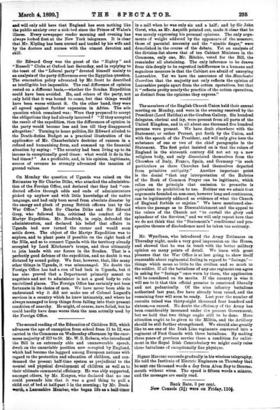The second reading of the Education of Children Bill, which
advances the age of exemption from school from 11 to 12, was carried in the Commons on Wednesday afternoon by the enor- mous majority of 317 to n. Mr. W. S. Robson, who introduced the Bill in an extremely able and unanswerable speech, dwelt on the unenviable position now occupied by England, which had become the laggard among European nations with regard to the protection and education of children, and con- demned the present half-time system as prejudicial to the mental and physical development of children as well as to their ultimate commercial efficiency. He was ably supported, amongst others, by Mr. Kenyon, who declared that no one could persuade him that it was a good thing to pull a child out of bed at half-past 5 in the morning; by Mr. Duck- worth, a Lancashire Member, who began life as a half-timer in a mill when he was only six and a half; and by Sir John Gorst, who, as Mr. Asquith pointed out, made it clear that he was merely expressing his personal opinions. The only argu- ments of weight adduced by the opponents of the measure, those of parental necessity and the "nimble finger," were demolished in the course of the debate. Yet an analysis of the division-list shows that of ten Cabinet Ministers in the Commons, only one, Mr. Ritchie, voted for the Bill, the remainder all abstaining. The only inference to be drawn from this deeply to be regretted indifference to a humane and sagacious measure is that the Cabinet are afraid of annoying Lancashire. Yet we have the assurance of the Manchester Guardian that the majority not only reflects the opinion of Lancashire people apart from the cotton operatives, but that it "reflects pretty nearlythe practice of the cotton operatives, as distinct from the opinions they express."






































 Previous page
Previous page